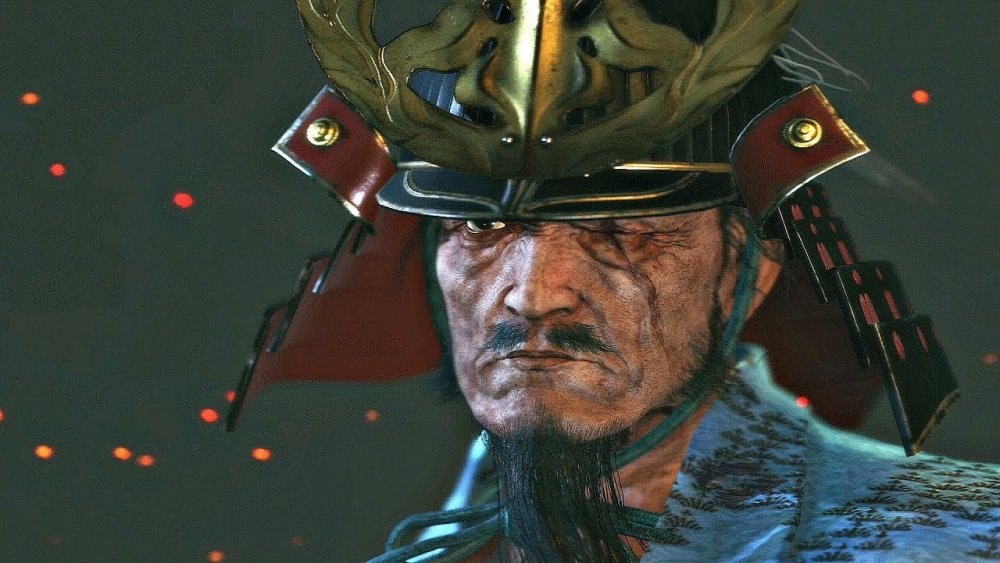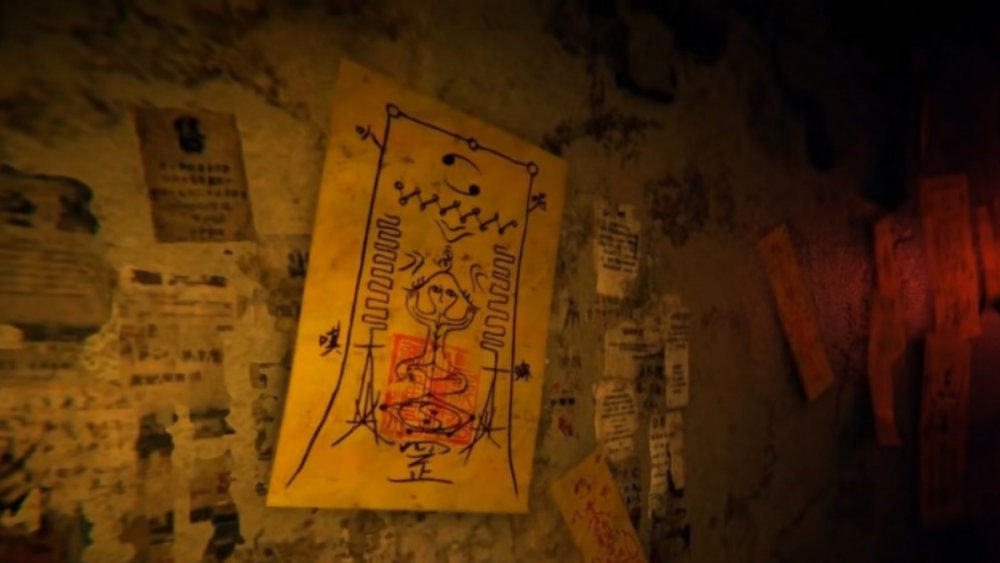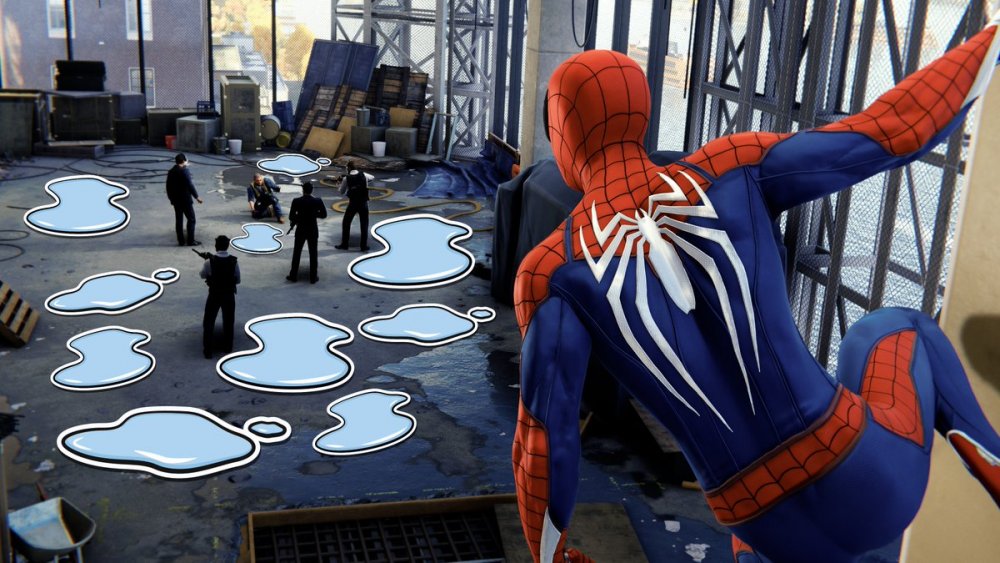The Most Bizarre Gaming Stories Of The Last Decade
It's been an incredible decade for gaming. The video game industry generated an estimated $152 billion in 2019, over seven times 2009's revenue. Video games have gone from a primarily solo experience to a phenomenon that fills arenas with thousands of people and draws millions of online viewers. Not everything was great, though, with the fantastic sales numbers coming at a price. Big publishers want bigger games done faster, and continue to look for new and ever more insidious ways of making money off of them.
Beyond the good and the bad, gaming's surge in popularity over the last ten years spawned some strange encounters. When you forge a community from millions of people from hundreds of different countries, cultures, backgrounds, and perspectives, things are bound to get a little weird. From questionable marketing stunts to impostors, here are the most bizarre gaming moments of the last decade.
Hot date in a castle
In 2014, users of the popular dating app Tinder reported a high amount of matches with girls inviting them to play a game. Not the type of game one might expect on a dating app, but a game of Castle Clash, one of the various Clash of Clans knockoffs. Instead of sending blatantly automated links as most spam accounts do, these "girls" opened up with what seemed like an authentic conversation, mentioning they liked video games, especially Castle Clash. Not long after, they'd send the dreaded link confirming it had all been a ruse to get users to spend money on the game.
People suspected IGG.com, the company behind the game, of perpetrating the scam. Though the most likely scenario, the theory remains unproven. IGG might have also fallen prey to a scheme by a third party they'd contracted to market the game. The world may never know the truth.
Missing girl found living in cyber cafe a decade later
In 2005, 14-year old Xiao Yun had a heated argument with her parents that ended with Yun abruptly leaving the house. Her family did not see or hear from her again, and she was presumed dead until police found her living in a cyber cafe in 2015 during a routine check. Yun spent the previous decade drifting between cyber cafes and bathhouses. She dedicated most of her days to playing the multiplayer shooter CrossFire and paid for her living expenses with money made working at the various cafes and donations from other patrons.
Yun, who the police discovered using a fake identification card, had to pay a fine of over £100 (about $131). Through the ordeal, her mother never gave up on her and kept the same phone number, hoping she would call. "I have a stubborn personality and a short temper, so I used to scold her. But it's already been 10 years and now she's an adult. I will never scold her again," she told The Straight Times. Yun and her family have since reunited. There's no word on whether the still plays CrossFire.
Devotion falls victim to Chinese censorship
Devotion, a first-person psychological horror title from Red Candle Games, released for PC in February 2019. Despite its positive reception, the game flew under the radar for many players as it was pulled from Steam following an unfortunate controversy. Devotion is a Taiwanese game that also takes place in Taiwan. As you may be aware, Taiwan and China aren't on the best of terms these days. Devotion's developers claim they unwittingly included an image in the game that compared Chinese President Xi Jinping's appearance to Winnie the Pooh, a persistent meme the Chinese government really does not like.
In the 24 hours following Devotion's release, over 2,000 angry Chinese players left negative reviews on the game's Steam page. The reviews went from overwhelmingly positive to mostly negative. Later, more players came forward with new elements of the game that allegedly represent further negative references to China. Following the backlash, Red Candle pulled Devotion for a "QA check." It's unclear whether the game will ever return to Steam. Even if it does, you shouldn't expect to play it anytime soon.
The great FIFA conspiracy
In June 2019, Twitch streamer Nick "RunTheFutMarket" Bartels exposed several of the world's top FIFA 2020 pros for conspiring in a private Discord channel to avoid playing competitively against each other. The competitive FIFA 2020 ladder allows players to arrange matches every weekend to win points and loot. The best players in the world naturally have a high chance of crushing most of the player base, but things aren't so easy when they have to face other top players.
To maximize their winnings and make their matches easier, several top players created a secret network where they would arrange matches in a way that they'd never have to face other members of their elite club. After Bartels exposed the channel, EA punished only one of the perpetrators, NYC_CHris, handing out a suspension from two qualifier events. While it's refreshing to see a pro getting punished, the consequences don't seem to fit the crime, especially since the publisher didn't penalize all the players involved. Other esports organizations have handed out lifetime bans for match fixing, a violation that shares common ground with the tactics used by this covert FIFA 2020 group.
The PlayStation 4's message of death
In 2018, a large number of PlayStation 4 users claimed their console had stopped working out of nowhere. There was nothing wrong with the hardware, but the consoles seemed to require a factory reset to work again. Players then found out the culprit was a specific message composed of a string of characters that would seemingly brick the consoles.
Various users started using this message to ruin the days of people online. You didn't even need to open the message to mess up your console, all that needed to happen was for your console to receive it. In an attempt to prevent further problems, the community advised everyone to turn off messaging services. In a classic case of companies trying to brush off serious security issues, the Ask PlayStation UK team tweeted it had fixed the problem which apparently "wasn't bricking consoles, just sending them into a crash loop that can be quickly fixed in under 5 minutes." Because an exploit that lets strangers render your PlayStation unusable with a simple message totally isn't a big deal.
"You cheated not only the game, but yourself."
Soulslike games are divisive. While their inherent challenge earns the love of the hardcore segment of the gaming community, they often leave more casual players out in the cold. Upon the release of Sekiro: Shadow's Die Twice in 2019, players toyed with the possibility of a lower difficulty setting that would allow everyone to experience the game for its story. The discussion inspired a player to create Sekiro the Easy, a mod that makes the game easier by enhancing the protagonist's abilities and providing infinite Spirit Emblems.
After PC Gamer's James Davenport revealed he had defeated Sekiro's final boss using cheats, all hell broke loose. Fetusberry, a Twitter user dedicated to defending the "honor" of hardcore gaming, retaliated by scolding Davenport and all players who use mods. "You cheated not only the game, but yourself," tweeted Fetusberry. The message quickly caught fire, transforming into a meme exalted and mocked by gamers on both sides of the debate. Faced with an unending onslaught of harassment from gaming elitists, Davenport left Twitter. Meanwhile, Fetusberry's words live on in infamy.
The Culling 2 gets culled
The Culling was one of the first popular titles in the battle royale genre. It enjoyed moderate success upon its release in 2017 until titles like PlayerUnknown's Battlegrounds and Fortnite stole the spotlight. The developers were quick to start working on a sequel — aptly titled The Culling 2 — which came out not even a full year after the release of the original game.
It's tough to ship a game after such a short period in development, and it showed. The Culling 2 received devastatingly low reviews due to its unfinished state upon release. It was so bad that two days after launch, there were only two people still playing it. The game's director issued an apology and said he was going back to focus on the thing people wanted: the original game. The Culling 2 was then unceremoniously removed from steam and replaced by the original game. That should have been good news, but it wasn't. The second game didn't get replaced by a new or even the last version of the original game but instead with the already much-outdated vanilla one.
Spider-Man's Puddlegate
Graphical downgrades are sadly a thing in the gaming industry. Some games seem to possess amazing visuals when they first get announced, but then end up with a much more meager look upon release. The most egregious example of this is was the PC version of the original Watch Dogs, which was downgraded solely to avoid making the PlayStation and Xbox versions look bad in comparison.
While Watch Dogs' PC players had every reason to feel conned, Marvel's Spider-Man showed just how outrageous player expectations can be. The game looked just as good when announced at E3 as it did upon release, but some gamers got incredibly angry when they observed the devs had seemingly downgraded the number of puddles of water in one area of the game. The game didn't get downgraded, quite the opposite, in fact. Insomniac, the title's developer, mocked the whole thing by adding puddle stickers to Spider-Man's photo mode.
Overwatch's "social experiment"
In January 2019, Overwatch Contenders team Second Wind added "Ellie" to its roster. She quickly garnered a following because of how easily she climbed through the ranks, an unexpected jump from an unknown player. Her small presence online outside of games also raised questions. The world of gaming isn't welcoming to women, even when their skill greatly surpasses that of their male counterparts, leaving many skeptical of Ellie's true identity.
As it turned out, Ellie wasn't female at all. "Ellie" was, in reality, a male pro who goes by the name of "Punisher." To make it look more realistic, he had women talk over his games. Punisher would then use "Ellie" as a smurf account to make other players feel inept. Second Wind claimed they had no idea Ellie had been an impostor the entire time, and streamer Becca "Aspen" Rukavina said on Twitch that the situation was a "social experiment" that "got out of hand." While supposedly meant to highlight gender inequity in the gaming industry, the scheme ultimately made things harder for female players.
Younger streamer revealed as 58-year-old woman
Qiaobiluo Dianxia, also known as "Your Highness Qiaobiluo," pulled in a large amount of donations and followers on Chinese live-streaming platform DouYu. Though she refused to reveal her face during streams, the photos and clips she uploaded showed a young woman. Qiaobiluo's fans assumed she was the person depicted in these images.
During a livestream with vlogger Qingzi, Qiaobiluo hid behind the image of a cartoon character, claiming she would show her face if she received 100,000 yuan in donations. At some point, the image disappeared, revealing a middle-aged woman. Qiaobiluo only realized what had happened when her followers left the stream in droves. Your Highness Qiaobiluo was actually 58-years-old. Though some accused her of fraud, Qiaobiluo received an outpouring of support that turned her into the most searched streamer on the platform. Her fans now call her "Granny."











